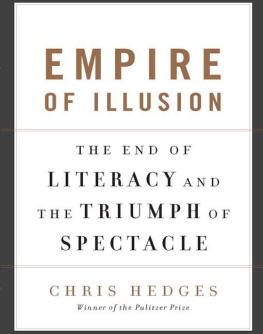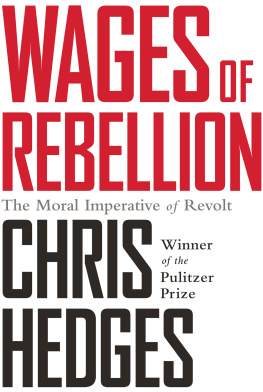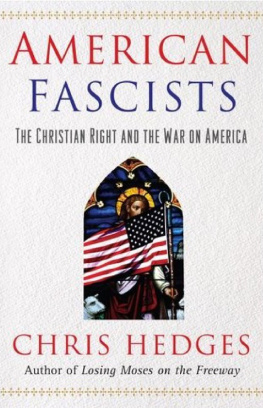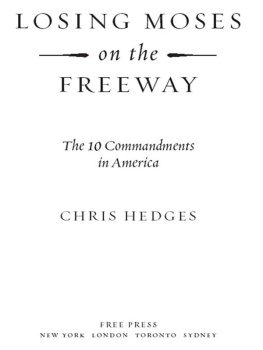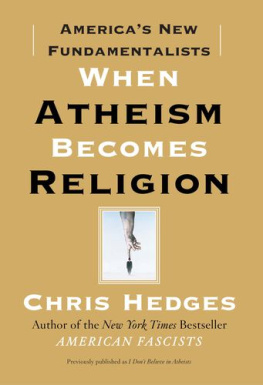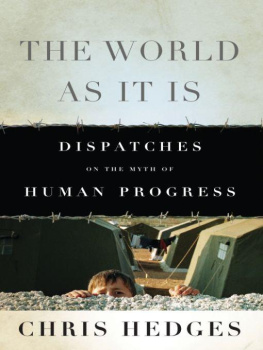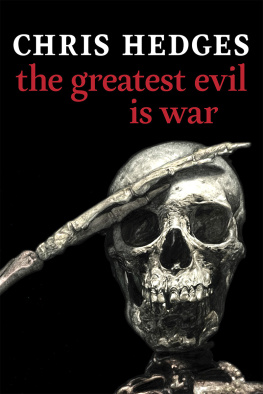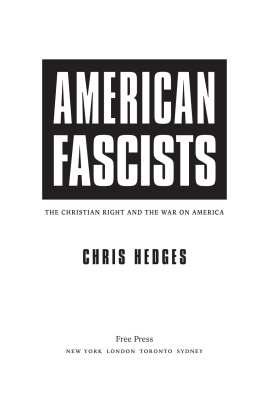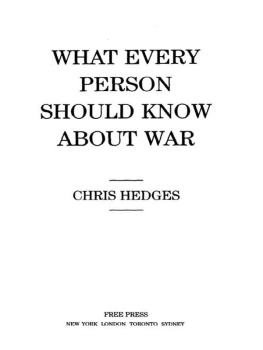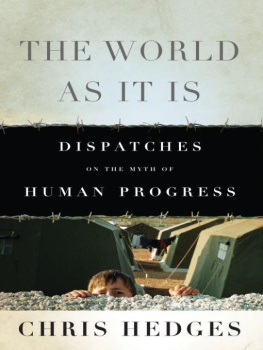WAR IS A FORCE THAT
GIVES US MEANING
WAR
IS A FORCE THAT
GIVES US MEANING
CHRIS HEDGES

PUBLICAFFAIRS
NEW YORK
Copyright 2002 by Chris Hedges.
Published in the United States by PublicAffairs,
a member of the Perseus Books Group.
All rights reserved.
No part of this book may be reproduced in any manner whatsoever without written permission except in the case of brief quotations embodied in critical articles and reviews. For information, address PublicAffairs, 250 West 57th Street, Suite 1321, New York NY 10107. PublicAffairs books are available at special discounts for bulk purchases in the U.S. by corporations, institutions, and other organizations. For more information, please contact the Special Markets Department at the Perseus Books Group,
11 Cambridge Center, Cambridge MA 02142,
or call (617) 252-5298.
LIBRARY OF CONGRESS CATALOGING-IN-PUBLICATION DATA
Hedges, Chris.
War is a force that gives us meaning / Chris Hedges.1st ed.
p. cm.
Includes index.
ISBN 1-586480499
1. War (Philosophy) 2. Hedges, Chris.
3. Military history, Modern20th century. I. Title.
U 21.2 H43 2002
355.02dc21
2002068136
FIRST EDITION
1 3 5 7 9 10 8 6 4 2
For my father, the Rev. Thomas Hedges,
who taught me that compassion was the highest virtue,
and for the Rev. Coleman Brown,
who has never let me forget it.
CONTENTS
If in smothering dreams you too could pace
Behind the wagon that we flung him in,
And watch the white eyes writhing in his face,
His hanging face, like a devils sick of sin;
If you could hear, at every jolt, the blood
Come gargling from the froth-corrupted lungs,
Obscene as cancer, bitter as the cud
Of vile, incurable sores on innocent tongues,
My friend, you would not tell with such high zest
To children ardent for some desperate glory,
The old Lie: Dulce et decorum est
Pro Patria mori.
WILFRED OWEN
Dulce et decorum est
WAR IS A FORCE THAT
GIVES US MEANING
Only the dead have seen the end of war.
PLATO
S ARAJEVO IN THE SUMMER OF 1995 CAME CLOSE TO Dantes inner circle of hell. The city, surrounded by Serb gunners on the heights above, was subjected to hundreds of shells a day, all crashing into an area twice the size of Central Park. Ninety-millimeter tank rounds and blasts fired from huge 155-millimeter howitzers set up a deadly rhythm of detonations. Multiple Katyusha rocketswhooshing overheadburst in rapid succession; they could take down a four- or five-story apartment building in seconds, killing or wounding everyone inside. There was no running water or electricity and little to eat; most people were subsisting on a bowl of soup a day. It was possible to enter the besieged city only by driving down a dirt track on Mount Igman, one stretch directly in the line of Serb fire. The vehicles that had failed to make it lay twisted and upended in the ravine below, at times with the charred remains of their human cargo inside.
Families lived huddled in basements, and mothers, who had to make a mad dash to the common water taps set up by the United Nations, faced an excruciating choicewhether to run through the streets with their children or leave them in a building that might be rubble when they returned.
The hurling bits of iron fragmentation from exploding shells left bodies mangled, dismembered, decapitated. The other reporters and I slipped and slid in the blood and entrails thrown out by the shell blasts, heard the groans of anguish, and were, for our pains, in the sights of Serb snipers, often just a few hundred yards away. The latest victims lay with gaping wounds untended in the corridors of the hospitals that lacked antibiotics and painkillers.
When the cease-fires broke down, there would be four to five dead a day, and a dozen wounded. It was a roulette wheel of death, a wheel of fire that knew no distinctions of rank or nationality. By that summer, after nearly four years of fighting, forty-five foreign reporters had been killed, scores wounded. I livedsheltered in a side room in the Holiday Inn, its front smashed and battered by shellfirein a world bent on self-destruction, a world where lives were snuffed out at random.
War and conflict have marked most of my adult life. I began covering insurgencies in El Salvador, where I spent five years, then went on to Guatemala and Nicaragua and Colombia, through the first intifada in the West Bank and Gaza, the civil war in the Sudan and Yemen, the uprisings in Algeria and the Punjab, the fall of the Romanian dictator Nicolae Ceauescu, the Gulf War, the Kurdish rebellion in southeast Turkey and northern Iraq, the war in Bosnia, and finally to Kosovo. I have been in ambushes on desolate stretches of Central American roads, shot at in the marshes of southern Iraq, imprisoned in the Sudan, beaten by Saudi military police, deported from Libya and Iran, captured and held for a week by Iraqi Republican Guard during the Shiite rebellion following the Gulf War, strafed by Russian Mig21s in Bosnia, fired upon by Serb snipers, and shelled for days in Sarajevo with deafening rounds of heavy artillery that threw out thousands of deadly bits of iron fragments. I have seen too much of violent death. I have tasted too much of my own fear. I have painful memories that lie buried and untouched most of the time. It is never easy when they surface.
I learned early on that war forms its own culture. The rush of battle is a potent and often lethal addiction, for war is a drug, one I ingested for many years. It is peddled by mythmakershistorians, war correspondents, filmmakers, novelists, and the stateall of whom endow it with qualities it often does possess: excitement, exoticism, power, chances to rise above our small stations in life, and a bizarre and fantastic universe that has a grotesque and dark beauty. It dominates culture, distorts memory, corrupts language, and infects everything around it, even humor, which becomes preoccupied with the grim perversities of smut and death. Fundamental questions about the meaning, or meaninglessness, of our place on the planet are laid bare when we watch those around us sink to the lowest depths. War exposes the capacity for evil that lurks not far below the surface within all of us. And this is why for many war is so hard to discuss once it is over.
The enduring attraction of war is this: Even with its destruction and carnage it can give us what we long for in life. It can give us purpose, meaning, a reason for living. Only when we are in the midst of conflict does the shallowness and vapidness of much of our lives become apparent. Trivia dominates our conversations and increasingly our airwaves. And war is an enticing elixir. It gives us resolve, a cause. It allows us to be noble. And those who have the least meaning in their lives, the impoverished refugees in Gaza, the disenfranchised North African immigrants in France, even the legions of young who live in the splendid indolence and safety of the industrialized world, are all susceptible to wars appeal.
Those who make war do so for many reasons, although many of these motives are never acknowledged publicly.
The Palestinian uprising was not just about throwing the Israelis out of Gaza and the West Bank, but also about crushing the urban elite, the shop owners and businessmen, in East Jerusalem and Gaza City. The strikes organized by the shabab, the young men who fueled the uprising from the refugee camps, hurt the Palestinian community far more than they hurt the Israelis. In Bosnia it was the same, the anger turned against a Communist hierarchy that kept for itself the privileges and perks of power even as power slipped from their hands in the decaying state. There is little that angers the disenfranchised more than those who fail to exercise power yet reap powerful rewards. Despots can be understood, even tolerated, but parasites rarely last long.


